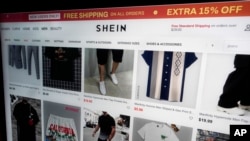China's e-commerce retailers, faced with weak domestic consumption, are targeting inflation-battered South Korean customers who want low-cost items despite possible human rights violations associated with their production.
South Korea's e-commerce purchases from companies in China such as AliExpress and Temu will surpass online purchases from the United States this year for the first time if soaring sales continue in the fourth quarter.
In the first three quarters of the year, South Koreans made online purchases worth more than $3.5 billion from sellers outside the country. China accounted for 46.4% of those purchases, while the U.S. accounted for 29.1%, according to South Korea's Customs Services.
That's more than a 100% increase in South Korea's online purchases from China compared to the same period last year, according to BusinessKorea. The growth came despite an 8.2% drop in China's overall exports to South Korea in October compared to a year ago, according to Chinese customs data quoted by BusinessKorea.
Louis Kuijs, Asian Pacific chief economist at S&P Global Ratings focusing on e-commerce, served as a senior economist at the World Bank in Beijing from 2004 to 2011. He told VOA via email, "It is not too surprising that some of the companies are trying to sell abroad, especially as consumption demand in China is not growing very fast."
Chinese consumers slow spending
China's consumption continues to be sluggish amid real estate crises and sinking exports. In October, consumer prices sank on items ranging from coffee to pork, while almost everywhere else, rising prices stunned consumers on each shopping trip.
"Growing e-commerce sales overseas are a positive for the Chinese economy," said Robert Walker, an economist at Australia's Lowy Institute's Indo-Pacific Development Center focusing on emerging Asian economies.
Walker continued, "However, foreign e-commerce consumption is unlikely to be enough to offset the overall slowdown in China's economy or weak domestic consumption in any significant way."
Discounters count on inflation abroad
Chinese online retailers such as AliExpress, Temu, and Shein have been banking on inflation in countries like South Korea and Japan to make their low-cost goods attractive to price-conscious consumers.
In South Korea, those retailers were the top shopping apps, being quickest to reach 2 million downloads between August and October.
Temu — which debuted in South Korea and Japan in July — and Shein were also the top two apps in Japan, reaching 4 million downloads during the same period.
"The question for Chinese e-commerce platforms will be whether they can hold that market share as inflation declines and developed economies improve, or consumers in [South] Korea and other countries return to e-commerce platforms offering more expensive but higher-end goods," said Troy Stangarone, senior director at the Korea Economic Institute.
Accusations of forced labor
Temu and Shein have been accused of using forced labor in China to manufacture items at low costs.
In a report released in June, U.S. Representative Mike Gallagher, chairman of the House Select Committee on the Chinese Communist Party, said Temu and Shein use a loophole in U.S. tariff law — the de minimis provision of the 1930 Tariff Act — to sell goods manufactured with forced labor to U.S. customers in violation of the Uyghur Forced Labor Prevention Act (UFLPA).
The de minimis provision allows goods imported by one person on one day under $800 to pass U.S. Customs and Border Protection with limited inspection.
In December 2021, U.S. President Joe Biden signed UFLPA, which strengthens the existing prohibition against the U.S. importation of goods made by forced labor in the Xinjian Uyghur autonomous region in China.
Gallagher's office told VOA via email on Monday that Temu's "business model seems to be organized around exploiting a de minimis standard that allows its U.S. imports to avoid scrutiny."
Gallagher said in a statement emailed by his office, "I encourage nations that share American values, like Japan and South Korea, to take a hard look at this company that could be flooding their markets with goods tainted by forced labor and undermining their domestic industry."




